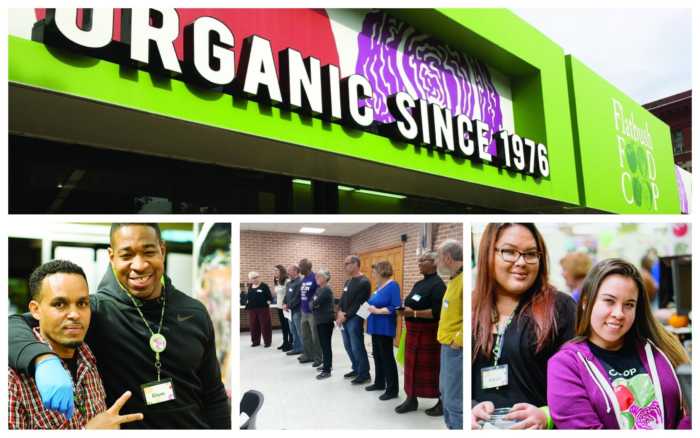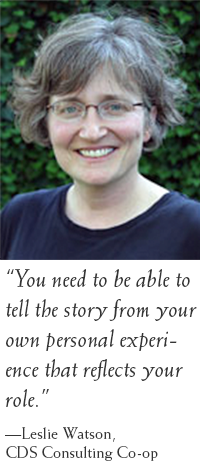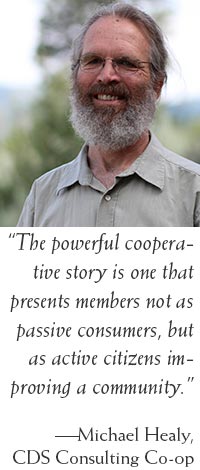
In our digitally-connected universe, there has been an explosion of stories—and many of them come to us like processed food. Quick, canned, too many empty calories. So much of what people encounter in the form of news or stories about organizations or individuals feels inconsequential or insincere. All of us have experienced what that feels like, wading through an information overload to try to suss out the good stuff, ignoring the rest.
Good stories are more than just shared information, it’s how we relate to each other, and ideally, develop understanding of people and our world. People crave connection and meaning, and it’s what cooperatives want to authentically create in their communities. Having a strong, powerful relationship with people is an inherent strength of the cooperative business model, yet one that is continually challenged, and always in need of being renewed and refreshed.
Stories that move people to action or inspire loyalty, are the result of skill, planning and commitment. They provide more depth than reports and touch people on a personal level. If a co-op wants to expand its reach, it must be strategic about the kinds of stories it tells, and it must build the capacity of every individual involved in sharing their own story about how they relate to the co-op.
 There is an art to storytelling, and that might make it seem like a more intimidating prospect, but like any skill, with intention, planning, and practice, it gets better. Leslie Watson, board leadership development consultant, finds that planning and practice are essential for anyone seeking to be a better storyteller. She does a key-word exercise with boards who want to practice telling their story, or want to create an ‘elevator speech’ about the co-op. “Often people don’t do it perfectly the first time. That’s not unusual. Practicing it is a worthwhile use of a board’s time.”
There is an art to storytelling, and that might make it seem like a more intimidating prospect, but like any skill, with intention, planning, and practice, it gets better. Leslie Watson, board leadership development consultant, finds that planning and practice are essential for anyone seeking to be a better storyteller. She does a key-word exercise with boards who want to practice telling their story, or want to create an ‘elevator speech’ about the co-op. “Often people don’t do it perfectly the first time. That’s not unusual. Practicing it is a worthwhile use of a board’s time.”
Watson noted that leaders need to convey their own story as individuals connected to the co-op, within the story of the co-op as a whole. For boards and managers, their storytelling roles as well as their ability to tell them, is important.
“You need to be able to tell it from your own personal experience that reflects your role as a director. Intention means connecting yourself with the broader story of the co-op. While it’s the overall co-op story you are telling, individuals have different perspectives and experiences with the co-op. Individuals need to be in the broader story and have what they say be personal and meaningful.”
For Watson, this is accomplished by focusing on two things in storytelling practice: the ability to tell an engaging story, and being able to share passion for why you and other people care about the co-op. This is especially important for co-ops that may be struggling with an issue or challenge and communicating it to owners. “It can be challenging to hit the right tone in talking with members. The need for food co-op storytelling is even greater than ever. We need stories told authentically, honestly and strategically as a call to action, not despair. You don’t want to be caught off guard when people ask tough questions.”
Stories often fall flat because people lack either enthusiasm for conveying it, intention in telling the story, or a personal connection with the audience. Hiring someone to help lead you through the process will enhance your intentional messages, assist with planning, and strengthen relationships. To develop and tell more impactful stories, it’s important to evaluate communications internally and externally (marketing materials, speeches, staff training and communication, leadership development, etc.) by addressing the following questions:
- What is the purpose of this communication?
- Who is it speaking to?
- What should this communication do?
- How do you want people to feel?
- What do you want people to do?
Connecting with an audience requires emotional intelligence and, for grocers, good customer service skills. Be able to put yourself in others’ shoes, and consider the other side of an argument. Want to connect with a working mom or retired person in your customer base? Think about what makes them tick. Understand your customers’ needs and motivation and let them know you get it.

Storytelling is where passion for the co-op really comes through. Use the elements of literature: character, conflict, action, context, and emotion. Design your stories around what you want people to remember about the co-op.
Michael Healy, board leadership development consultant, has also worked with boards on improving their storytelling to better enhance their relationship with co-op owners. “Let’s be intentional about this sort of communication, and let’s practice. I like to make it fun and useful, so people feel comfortable being an ambassador for the co-op.”
Healy has also been influenced by Jonah Sachs, author of Winning the Story Wars, who shares in his book Joseph Campbell’s concept of the “hero’s journey” wherein the audience of the story (i.e. co-op owners) are the heroes within the story being told. While that’s not the only story that could be told, it is one that is very compelling to customers and owners of cooperatives and other businesses focused on social and economic impact.
Healy encourages co-op leaders to try it—write a story with the co-op or individual as the hero. “Can you tell a story in such a way that the customer can be a part of it or see themselves in it?” And then practice it, one-on-one and verbally with others. “The idea of practice is so important. It’s not just a one-time event. You could do it at any board meeting. Board members often feel nervous about it. Practice helps people feel less nervous.”
For Healy, conversations about co-op identity are a crucial part of intentional storytelling as well as inviting participation. “Can we articulate what it means to be a co-op, or a natural food store rooted in our community? Who are we telling the story to? What is their journey? How are they trying to make their life or their community better, and how are they doing that through participating in the co-op?” Healy said the value of going through this exercise is to illuminate something and communicate it in a different, more effective way. “The powerful cooperative story is one that presents members not as passive consumers, but as active citizens improving a community.”
Have more questions?
Get in touch with one of our consultants.
